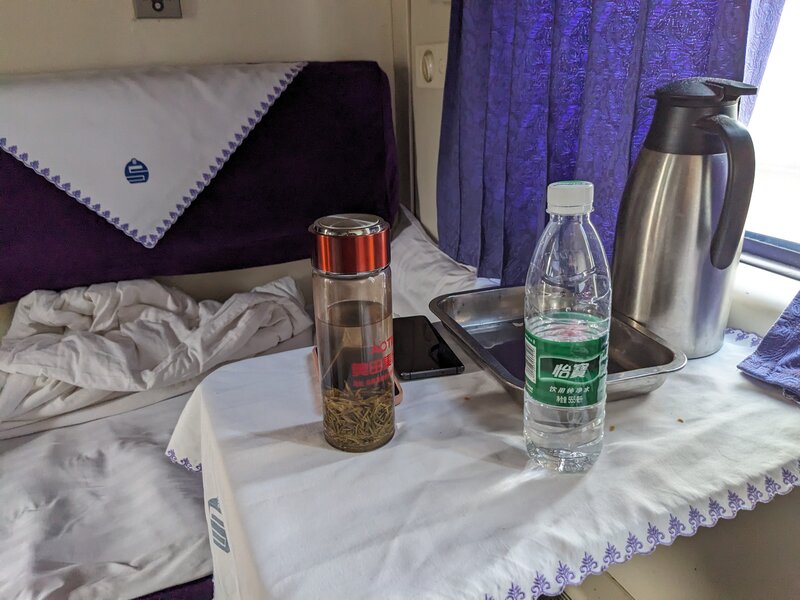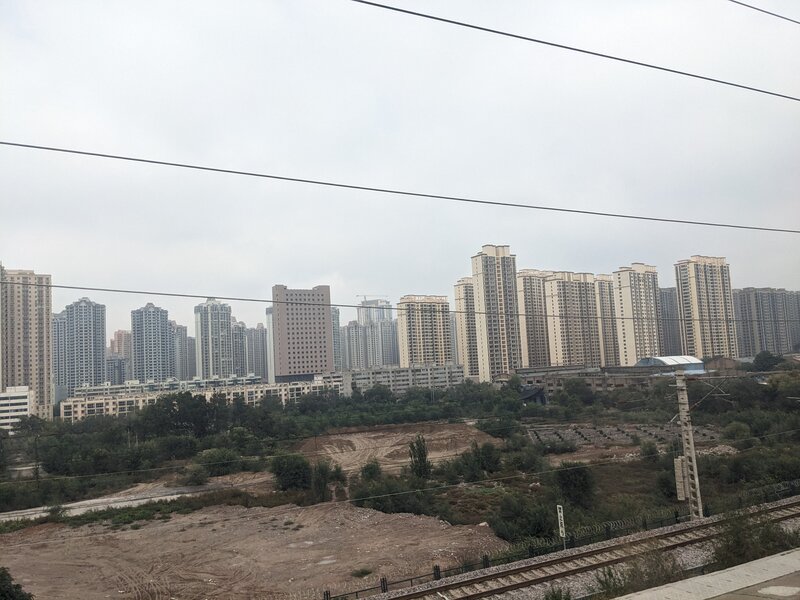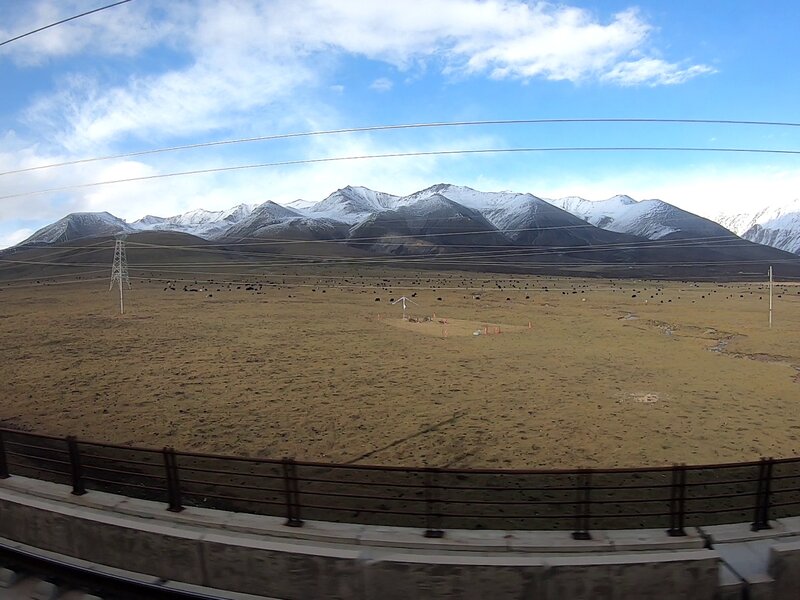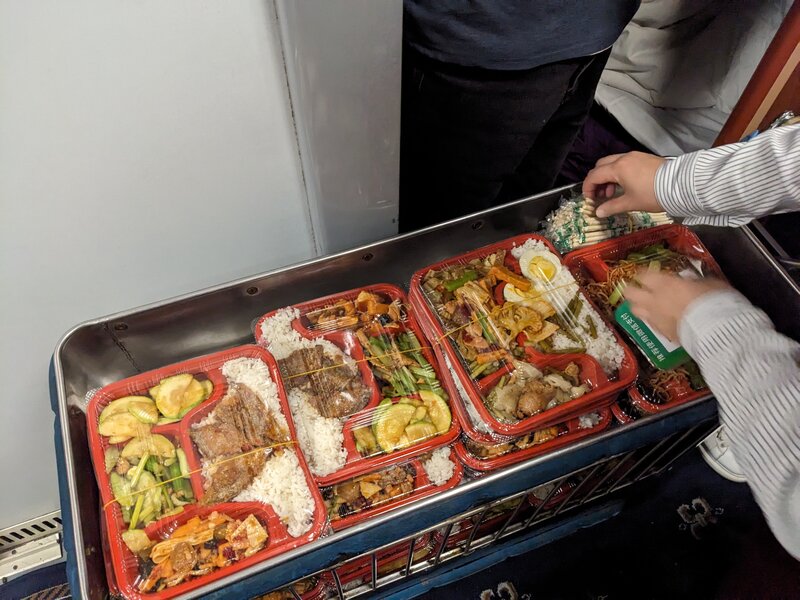Despite getting almost no sleep at Xi’an station the night before, I woke up early with the sunrise. I figured it would be better to stay awake during the day because staying up all night on this twenty-six-hour train ride sounded boring. I sat up and looked out the window as the arid landscapes of Western China rolled past. But the more pressing reason that I couldn’t sleep was that I needed a plan. I didn’t even know how long I would stay in Urumqi or where I would go next. Time was ticking and some things just couldn’t be left to spontaneity. Although Golden Week had just ended, I still worried that the train tickets might sell out. And what if the border to Central Asia stopped operating because of the holiday or harsh temperatures? Autumn had peaked, and winter was nearing. It wasn’t hard to imagine that, in the mountainous parts of far-western Xinjiang, the weather conditions might take a turn at any moment. All these factors called for some kind of game plan.

I was too hungry to think clearly because I hadn’t had much to eat in Xi’an. The restaurant car was still closed but fortunately I had a bowl of instant noodles stashed in the bottom of my backpack, all crumpled up. I had never been more glad to see a pack of instant noodles. But there were no utensils and I wasn’t sure how to eat without them. Drinking it straight out of the bowl seemed like a bad idea because the water would be too hot. So I walked along the corridor through many cars, looking for people who might have a spare pair of chopsticks. Eventually, I spotted a middle-aged couple having instant noodles in a cabin far away from mine and asked them where I could get a pair of chopsticks. They didn’t understand at first, but when I mimed a man using chopsticks, they gave me a pair. It wasn’t really my intention to bum a pair, but I wasn’t about to say no to the chopsticks in my hands. “Xiexie,” I thanked them and even bowed a little bit, which made them look at me strangely.
My freeloading streak didn’t end with bumming the chopsticks. I was coming down with a stomachache and used up the little toilet paper that I had. Running low was a bit of a problem because public restrooms in China don’t supply toilet paper and the one on the train was no exception. When I asked the crew where I could buy some toilet paper, they mentioned that the train didn’t sell any. Just when I was starting to worry, a conductor handed me a small pack of toilet paper from her personal stash. Resolving to do a proper supply run before the next time I got on a train, I came back to my cabin and had the instant noodles for breakfast. The train mostly passed through nothingness, broken up now and then by clusters of industrial wastelands. The sky was gray throughout, likely from pollution. The train would sometimes pass through a city that suddenly appeared out of nowhere, and I would look outside, admiring the monotonous and bleak concrete high-rises. There was something melancholic about the way those monolithic towers stood tall beneath the vast, tainted sky. Who lived there? What were their lives like and how different were they from mine? I would never know. The train didn’t care. It kept on moving.

Brutal concrete high-rises under polluted sky
I didn’t really know what I was going to do in Xinjiang or what to expect, but I had a rough idea of how I wanted to get to Central Asia. My plan was to cross the China-Kyrgyzstan border in the far west. This remote mountain pass was called Irkeshtam and it had long fascinated me. It sat in the middle of nowhere on high mountains, around 200km (124 mi) away from the nearest city, Kashgar, with no clear transportation options for getting in or out. There were more straightforward alternatives such as taking a sleeper train into Kazakhstan, but my heart was set on Irkeshtam. Choosing that route, though, meant giving up on some other Central Asian destinations. I wanted to visit Kazakhstan, but heading north from Kyrgyzstan and then circling back down didn’t make much sense. Besides, with only nineteen days left, it wasn’t realistic to visit many Central Asian countries anyway. I would just have to save some of them for the next time. After Kyrgyzstan, I was leaning toward going to Uzbekistan before continuing on to the Caucasus. I just couldn’t pass up Uzbekistan because the photos of its unique Islamic architecture were too intriguing.
The plan felt pretty solid until I tried to fit the actual cities into the timeframe. I wanted to visit many places like the Aral Sea in Uzbekistan, but getting there would cost me a few days. That wasn’t ideal because I still had no idea how long it would take to get through the Caucasus and Europe later. Even if I somehow got to those places, what was the point if I was too rushed to actually explore? So I made a rather drastic trade-off. I convinced myself to give up on my goal of reaching Dublin and instead go only as far as Istanbul, allowing me more time to explore each place more deeply. The new plan was to leave for Kashgar preferably the same day I arrived in Urumqi, cross into Central Asia, travel to the Aral Sea in Nukus and Moynaq, explore the Caucasus, and finish in Istanbul. Basically, to accommodate the Aral Sea excursion, I cut down on the part of the trip in Europe and Xinjiang. It felt like a fair trade-off. It was good enough. Technically I would still cross into Europe and complete the Silk Road once I reached Istanbul.
While all these thoughts were going on, the scenery outside had changed. The gray sky and unseemly man-made structures had disappeared. We were gaining altitude, entering a desolate region of snow-covered mountain ranges, separated by wide plains where horses and cows were grazing. I joined some fellow passengers who were standing in the corridor and looking out the window. A few exclamations of “Xueshan!” were heard, which I assumed meant a snowy mountain. The train had been running at full speed for hours, and this dramatic shift in scenery made me realize just how massive this country really was. While admiring the view, a middle-aged couple in the next cabin and I struck up a conversation and became acquainted. Although the conversation was difficult due to my very limited Mandarin, I managed to explain that I was in China for a holiday and gathered that they had been to Seoul and had enjoyed it. The husband didn’t say much but seemed intrigued by my presence, uttering something about “Waiguoren” which meant a foreigner. Some other passengers also seemed to be interested in the fact that I was a foreigner, casting curious glances but otherwise leaving me alone.

The train dashed through the snow-covered mountains of Western China.
Soon the grazing fields and animals disappeared, and the mountains that once seemed far away drew closer until the train was practically threading through them. We entered a region of endless tunnels. Whenever the train went through a tunnel, the windows would turn pitch-black and the Internet would drop out completely. This made it difficult to pay for anything. Whenever I wanted to buy a snack or a bottle of water, I had to stand around until the train briefly emerged from a tunnel, hurriedly scan a barcode for payment before we plunged back into another tunnel. I wasn’t the only one. Other passengers stood around too, phones in hand, waiting until they had the Internet and could scan the code for payment. A price to pay, I thought, for the convenience of a cashless society.
With more time on my hands, I was able to think through the plans for the coming days. I committed to leaving for Kashgar the same day I arrived in Urumqi. There just wasn’t enough time to stay in every city, and Kashgar just seemed more interesting than the others. The plan was to arrive in Urumqi at 6:30AM the following day, explore the city for a few hours, and then board a sleeper train that would take me to Kashgar by the next morning. It was an efficient arrangement as I didn’t have to book accommodation for two nights. The only issue was availability. There weren’t many sleeper trains and a lot of them were selling out. My entire itinerary hinged on getting a ticket on one of those trains. But the spotty Internet connection hit me again. Just when I pressed the button to finalize the booking, the Internet dropped out, and this time, stayed down for hours. Waiting for the signal to come back felt like forever. Luckily, when the Internet finally came back, there were still some tickets left. I bought a ticket and was all set to leave Urumqi by 2:40PM the following day.

A semi-hot dinner box. And a whole lot of chopsticks!
The sun was slowly setting in the mountains and the temperature was also dropping. I put on my jacket and looked out into the dusk falling on the endless barren lands of Western China. It was beautiful, and I was glad to be here. I could have kept waiting until the moment was right or let my foolish idea remain a mere daydream. But the best time to chase those imaginary roads was right now. I began reflecting on my earlier decision to get only as far as Istanbul and not go all the way to Dublin. It was a reasonable trade-off to take things slower and explore more deeply. But if I wanted to go from Beijing to Dublin, there was no better time to try that than the present. The sun would invariably continue to set somewhere every day, casting a burning twilight in its wake. But it would be different each time. And the best time–the only time–to witness the one unfolding before me was right now. Tomorrow would be too late.
Fitting the entire daydream into the timeframe of reality didn’t necessarily mean that I was destined to skim through everything. I was in the habit of evaluating decisions in life purely in terms of trade-offs. But life was more about chasing two rabbits and trying to catch both of them, than choosing which one to chase. I needed to pursue normal ideas as well as absurd ones. I needed to prepare for what would come but also live for the moment. I needed to race to Dublin but also experience everything on the way to the fullest. If the price of doing so was sleeping more nights on a bench or wrestling with uncertainty, I was glad to pay that. Once again, I decided to make my way to Dublin–this time with more certainty.
The idea that not everything could be left to a trade-off sounded strange. But here in the barren steppes of Western China, things weren’t as simple. That left me confused and a little afraid. I hesitated at the thought of breaking out of my habitual mindset. I was afraid of trying and failing. I didn’t want to face the disappointment of not being able to reach Dublin. And that fear made me wary of wanting it in the first place. Regardless, the train kept on running. The sky surrendered to the darkness that crept in from every direction. Soon, we were gliding through the darkness dotted by occasional distant lights of unknown settlements. The night slipped into the cabin too, and soon the only sound to be heard was the metallic pulse of the train wheels.